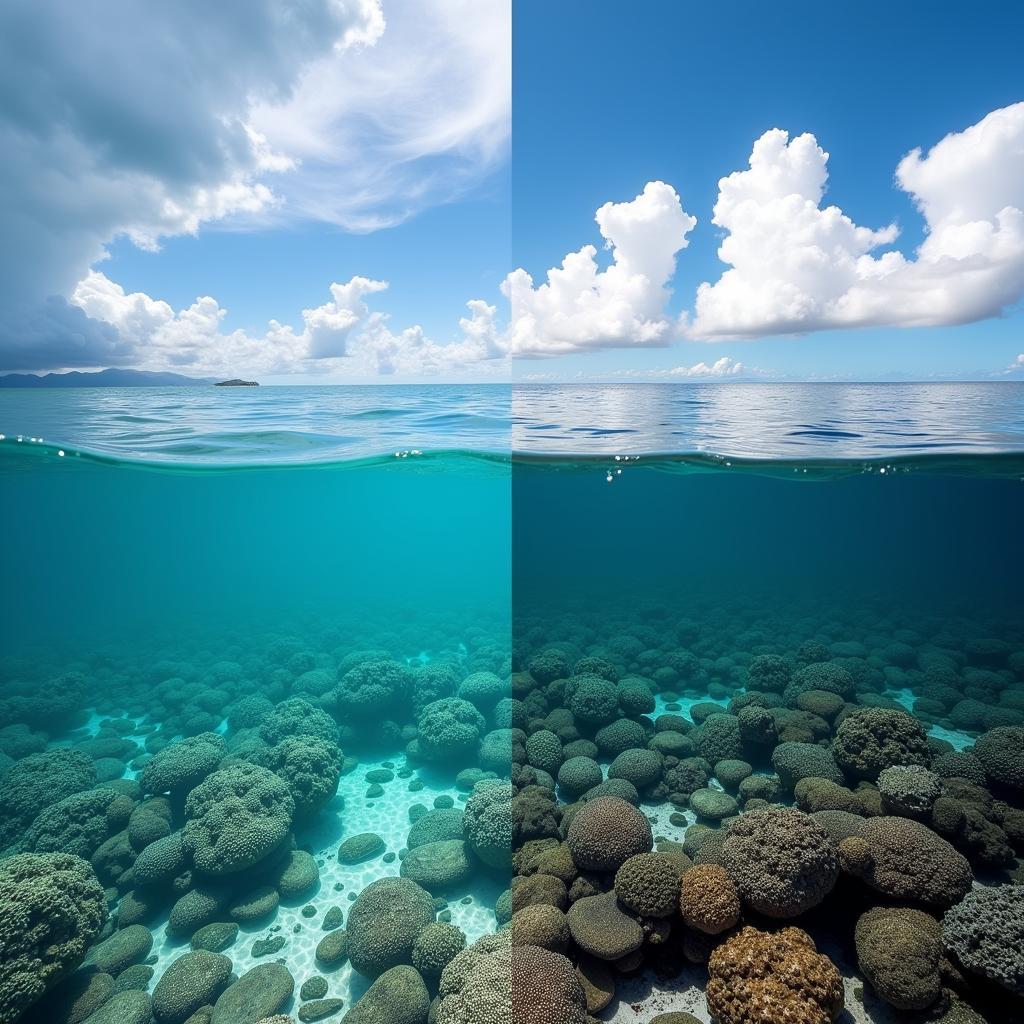Climate change and its effects on marine ecosystems have become increasingly prevalent topics in IELTS Writing Task 2. Based on analysis of past exam questions from 2018-2023, this theme appears in approximately 15% of environment-related tasks, with a projected increase in frequency for 2024. The impact of climate change on ocean ecosystems particularly resonates with candidates from coastal nations.
Recent Exam Question Analysis
Some people believe that the impact of climate change on ocean ecosystems is exaggerated, while others argue it poses a serious threat to marine life and coastal communities. Discuss both views and give your opinion.

Band 8.5 Sample Essay
The debate over climate change’s effects on marine environments has intensified in recent years, with divergent views on its severity. While some dismiss these concerns as overstated, I firmly believe that climate change poses a grave threat to ocean ecosystems and coastal populations.
Those who minimize climate change’s impact often argue that oceans have natural cycles of warming and cooling, suggesting current changes are within normal parameters. They point to historical temperature fluctuations and the ocean’s vast capacity to absorb environmental changes. Additionally, they cite examples of marine species adapting to varying conditions over time.
However, the role of oceans in climate stability provides compelling evidence of serious threats. Scientific data demonstrates unprecedented rates of ocean acidification, destroying coral reefs and disrupting marine food chains. Rising sea temperatures have led to mass coral bleaching events, while melting polar ice affects global ocean currents. Moreover, coastal communities worldwide face increasing challenges from rising sea levels and extreme weather events.
The impact of climate change on ocean biodiversity is particularly concerning. Studies reveal declining fish populations, shifting migration patterns, and ecosystem disruptions that threaten both marine life and human communities dependent on ocean resources. These changes occur at rates far exceeding natural variation, making adaptation difficult for many species.
In conclusion, while skeptics may downplay the severity of climate change’s impact on oceans, the evidence strongly suggests these concerns are well-founded. The combination of scientific data and observable changes in marine ecosystems indicates an urgent need for global action to address this critical environmental challenge.
Band 6.5 Sample Essay
People have different opinions about how climate change affects the oceans. Some think it’s not very serious, but others say it’s a big problem. I think climate change is really dangerous for ocean life and people living near the sea.
Some people say we worry too much about climate change. They think the ocean is very big and can handle changes in temperature. They also say that animals in the sea can adapt to new conditions, like they did in the past. These people believe that scientists make the problem sound worse than it is.
However, I agree with those who think climate change is a serious problem. The ocean is getting warmer and more acidic, which kills coral reefs. Many fish are dying or moving to different places to find food. This is bad for fishermen and their families who need to catch fish to live. Also, when sea levels rise, it causes flooding in coastal areas.
The effects of climate change on global biodiversity show that many sea animals are in danger. Polar bears have less ice to live on, and sea turtles are losing their nesting beaches. These problems are happening faster than animals can adapt to them.
In conclusion, I believe climate change is causing real damage to ocean ecosystems. We need to take action now to protect the oceans and help the people who depend on them.
Analysis of Band Scores
Band 8.5 Essay Features:
- Sophisticated vocabulary and complex structures
- Clear organization with well-developed arguments
- Precise examples and scientific evidence
- Coherent progression of ideas
- Academic tone throughout
Band 6.5 Essay Features:
- Basic but clear vocabulary
- Simple but accurate sentence structures
- Limited range of complex expressions
- Some repetition of ideas
- Less formal tone
Key Vocabulary to Remember
- Ecosystem (n) /ˈiːkəʊsɪstəm/ – a biological community of interacting organisms
- Acidification (n) /əˌsɪdɪfɪˈkeɪʃn/ – the process of becoming acidic
- Biodiversity (n) /ˌbaɪəʊdaɪˈvɜːsəti/ – variety of life in a particular habitat
- Anthropogenic (adj) /ˌænθrəpəˈdʒenɪk/ – caused by human activity
- Mitigation (n) /ˌmɪtɪˈɡeɪʃn/ – reduction in severity
- Resilience (n) /rɪˈzɪliəns/ – ability to recover from difficulties
- Adaptation (n) /ˌædæpˈteɪʃn/ – process of changing to suit new conditions
For practice, try writing your own essay on this topic and share it in the comments. Future exam questions might focus on specific aspects like coral reef destruction, marine pollution, or coastal community adaptation strategies.